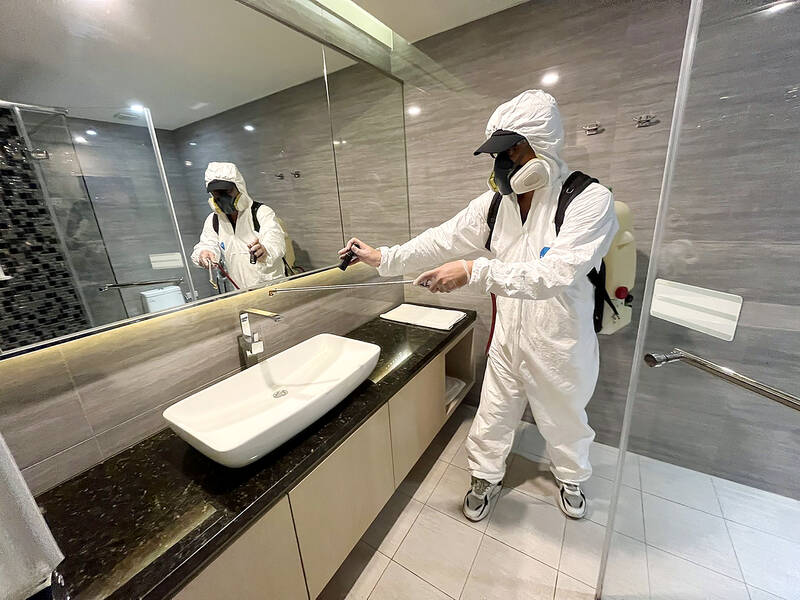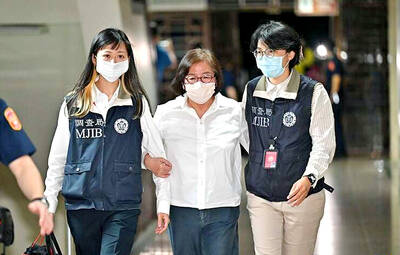Starting today, the travel advisory for all countries would be lowered to level 2 — “alert” — but people are still advised to get vaccinated and practice preventive measures when traveling abroad, the Central Epidemic Command Center (CECC) said yesterday, as it reported 52,338 new local COVID-19 cases.
The CECC raised the travel advisory to level 3 — “warning” — on March 21, 2020, at the beginning of the COVID-19 pandemic and advised people to avoid unnecessary travel abroad.
The downgrade is being implemented in coordination with today’s border reopening, said Centers for Disease Control (CDC) Deputy Director-General Chuang Jen-hsiang (莊人祥), who is the CECC’s spokesperson.

Photo: CNA
New case counts could be underreported following the reopening, as many countries have reduced their COVID-19 testing capacity, he said.
The pandemic is still ongoing, and people should get fully vaccinated against COVID-19 before traveling to other countries and take personal preventive measures when abroad, he added.
Personal preventive measures include washing hands thoroughly and frequently, observing cough etiquette, wearing a mask when needed, and avoiding crowded places and areas with high infection risk, Chuang said.
The CECC yesterday reported 52,338 new local and 67 imported cases, and 37 deaths.
Chuang said the local caseload is the second-highest since an outbreak driven by the Omicron BA.5 subvariant of SARS-CoV-2 began in August, but it is 4.6 percent lower than Wednesday last week.
The youngest fatality was a one-year-old boy who did not have chronic health conditions and was unvaccinated, said CDC Deputy Director-General Philip Lo (羅一鈞), deputy head of the CECC’s medical response division.
He was initially diagnosed with the common cold at a clinic, but was found unresponsive the following morning, he said.
He was not breathing and had no pulse when he arrived at an emergency room.
He tested positive for COVID-19 post-mortem, with a high cycle threshold value of 37.5, indicating a very low viral load, Lo said.
His cause of death was COVID-19 and respiratory failure, he added.
Lo said 10,709 courses of oral antiviral drugs for COVID-19 treatment were prescribed on Tuesday, marking the highest daily number since the BA.5 outbreak began.
Reporters asked if eligibility for being prescribed the Paxlovid antiviral could be expanded to include people aged 12 or older, similar to South Korea.
Lo said South Korea on May 13 lowered the minimum age requirement to 12, but people still need to meet certain criteria to be eligible, such as having underlying health conditions, the same as in Taiwan.
Taiwan has relatively loose eligibility criteria for Paxlovid prescription, which include being aged 12 or older and having a high-risk health condition, Lo said.
People in New Zealand need to have three high-risk health conditions to be eligible for the drug and two conditions are required in Australia, while Singapore has set the minimum age for eligibility at 18, he added.

Costa Rica sent a group of intelligence officials to Taiwan for a short-term training program, the first time the Central American country has done so since the countries ended official diplomatic relations in 2007, a Costa Rican media outlet reported last week. Five officials from the Costa Rican Directorate of Intelligence and Security last month spent 23 days in Taipei undergoing a series of training sessions focused on national security, La Nacion reported on Friday, quoting unnamed sources. The Costa Rican government has not confirmed the report. The Chinese embassy in Costa Rica protested the news, saying in a statement issued the same

Temperatures in New Taipei City’s Sindian District (新店) climbed past 37°C yesterday, as the Central Weather Administration (CWA) issued heat alerts for 16 municipalities, warning the public of intense heat expected across Taiwan. The hottest location in Taiwan was in Sindian, where the mercury reached 37.5°C at about 2pm, according to CWA data. Taipei’s Shilin District (士林) recorded a temperature of 37.4°C at noon, Taitung County’s Jinfeng Township (金峰) at 12:50 pm logged a temperature of 37.4°C and Miaoli County’s Toufen Township (頭份) reached 36.7°C at 11:40am, the CWA said. The weather agency yesterday issued a yellow level information notice for Taipei, New

Taiwan’s Liu Ming-i, right, who also goes by the name Ray Liu, poses with a Chinese Taipei flag after winning the gold medal in the men’s physique 170cm competition at the International Fitness and Bodybuilding Federation Asian Championship in Ajman, United Arab Emirates, yesterday.

CASE: Prosecutors have requested heavy sentences, citing a lack of remorse and the defendants’ role in ‘undermining the country’s democratic foundations’ Five people affiliated with the Chinese Nationalist Party (KMT), including senior staff from the party’s Taipei branch, were indicted yesterday for allegedly forging thousands of signatures to recall two Democratic Progressive Party (DPP) lawmakers. Those indicted include KMT Taipei chapter director Huang Lu Chin-ru (黃呂錦茹), secretary-general Chu Wen-ching (初文卿) and secretary Yao Fu-wen (姚富文), the Taipei District Prosecutors’ Office said in a news release. Prosecutors said the three were responsible for fabricating 5,211 signature forms — 2,537 related to the recall of DPP Legislator Wu Pei-yi (吳沛憶) and 2,674 for DPP Legislator Rosalia Wu (吳思瑤) — with forged entries accounting for